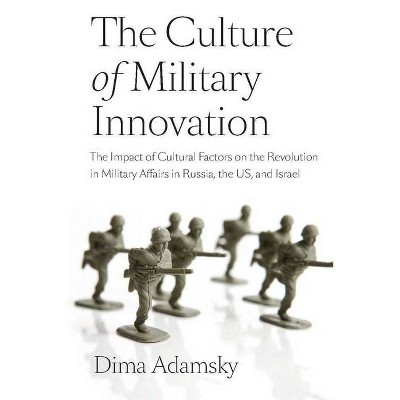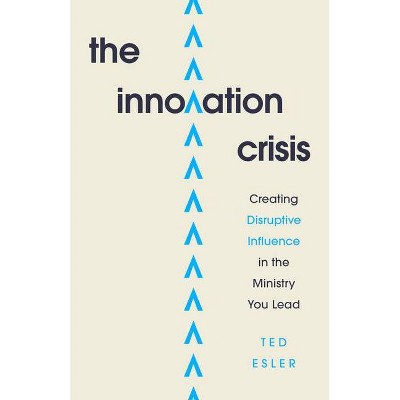The Culture of Military Innovation - by Dima Adamsky (Paperback)

Similar Products
Products of same category from the store
AllProduct info
<p/><br></br><p><b> About the Book </b></p></br></br>This book studies the impact of cultural factors on the course of military innovations.<p/><br></br><p><b> Book Synopsis </b></p></br></br>This book studies the impact of cultural factors on the course of military innovations.<p/><br></br><p><b> Review Quotes </b></p></br></br><br>Adamsky has written a theoretically robust and empirically compelling account of the development of the revolution in millitary affairs (RMA) in the Soviet Union, the US, and Israel . . . Adamsky's account is brief, but it will be of value to both academics and practitioners. Recommended. -R.M. Farley, <i>CHOICE</i><br><br>Adamsky's book is an indispensible guide not only to the Israeli experience with the RMA, but also to the manner in which armed forces around the world respond to upheavals in the nature of warfare.--David Rodman "<i>Israel Affairs</i>"<br><br>Adamsky's cultural perspective explains why the armed forces of the US, USSR, and Israel were so different from one another in grasping the significance of the Revolution in Military Affairs (RMA) since the 1970s. This rich, sophisticated, and nuanced study is indispensible for students of the RMA, military revolutions, and strategic cultures.--Azar Gat, Ezer Weitzman Professor of National Security "Tel Aviv University"<br><br>Culture dominates technical choice--a lesson of both practical and theoretical importance that emerges from this acute study of three of the world's most sophisticated militaries. Adamsky's mastery of three military literatures and the relevant social science makes this a pathbreaking work in strategic studies.--Eliot A. Cohen, Robert E. Osgood Professor of Strategic Studies, School of Advanced International Studies "Johns Hopkins University"<br><br>Despite the fact that the information- and precision-based RMA has not completely revolutionized all warfare, Adamsky properly recognizes strategic culture as a major factor in military innovation.--Peter R. Mansoor "<i>Foreign Affairs</i>"<br><br>Dima Adamsky's <i>The Culture of Military Innovation</i> is an account of how one intellectual paradigm, called the Revolution in Military Affairs (RMA), rose and fell in the militaries of the USSR, USA and Israel . . . The study distinguishes itself within its subdiscipline for its excellent sources (archival material from all three countries and interviews in Israel), skillful argumentation, and very intelligent case selection. Adamsky's cases connect logically and make for compelling reading.--Thomas Crosbie "Yale University, <i>Canadian Journal of Sociology</i>"<br><br>For Americans, the hardest 'cultural intelligence' lesson contained in <i>The Culture of Military Innovation</i> is that the possession of cutting-edge technology does not invariably lead to strategic genius. It thus behooves the Intelligence Community to monitor the 'dreamers' who sometimes suggest ideas, operational concepts, and applications that appear beyond their capabilities. As Adamsky suggests, ideas that appear fanciful to pragmatic Americans, might actually be a harbinger of systemic effects that will become manifest in the decades ahead.--James J. Wirtz "<i>International Journal of Intelligence & Counter Intelligence<i>"<br><br>If you have ever wondered what would happen if postmodernism became a template for organizational management, read this book . . . [T]his book has the potential to raise provocative and important issues for scholars studying the state. For this reason, the book will be of interest to scholars studying peace and war, and it has the potential to attract those interested in politics and culture--and their intersection.--Gregory Hooks "<i>American Journal of Sociology</i>"<br><br>Recent and ongoing conflicts have exposed fundamental flaws in what became RMA orthodoxy. <i>The Culture of Military Innovation</i> is useful, in part, because Adamsky illuminates many of the socio-cultural factors that help explain the broad acceptance of false assumptions among military strategists and the propensity of both state and non-state actors to develop military capabilities based on idealised visions of future armed conflict. His study also illuminates the relevance of cultural analysis to self-reflection and criticism.--H.R. McMaster "<i>Survival</i>"<br><br>The comparative cultural analysis is comprehensive, thoughtful, and interesting, and the book should be well-received and appreciated by academics and practitioners alike... Adamsky's analysis is impressive and persuasive. The empirical chapters are rich and deep, but also concise, clear, and accessible. From a theoretical perspective, the book is an excellent example of cultural analysis.--David W. Kearn "Jr., St. John's University, <i>Political Science Quarterly</i>"<br><br>The future of innovation in the military realm is by no means over . . . Greater wisdom concerning novel innovations in technology and the nature of war is required. The analysis offered in this excellent book is a good starting place to acquire that wisdom.--Stephen Blank "<i>Parameters: U.S. Army War College Quarterly</i>"<br><br>This book is a focused, disciplined, and brilliant effort to use the concept of strategic culture to explain how three countries proceeded in very different ways to develop new ways of warfare based on information technology. It breaks new ground intellectually, in its research and in its analysis, and helps men and women in the world of government better understand the world in which they operate.--Stephen Peter Rosen, Professor of National Security and Military Affairs, Department of Government "Harvard University"<br><br>This carefully researched work presents a detailed case study in comparative strategic culture and the revolution in military affairs . . . an ideal reference for strategists, scholars, armchair generals, and those interested in applying cultural models to organizational behavior.--Gene Klann "<i>Military Review</i>"<br><br>This is an outstanding study of comparative strategic culture and the Revolution in Military Affairs. Drawing on exhaustive research, it explains why the Soviets were the first to theorize about the RMA, the Americans were the first to develop RMA technologies, and the Israelis were the first to fight an RMA war.--Theo Farrell, Professor of War in the Modern World, King's College "London"<br><p/><br></br><p><b> About the Author </b></p></br></br>Dima Adamsky is a fellow at the National Security Studies Program at Harvard University. He has been a visiting fellow at the Institute of War and Peace Studies, Columbia University, and at the Norwegian Institute for Defense Studies.
Price History
Cheapest price in the interval: 26.49 on October 22, 2021
Most expensive price in the interval: 26.49 on December 20, 2021
Price Archive shows prices from various stores, lets you see history and find the cheapest. There is no actual sale on the website. For all support, inquiry and suggestion messagescommunication@pricearchive.us



















